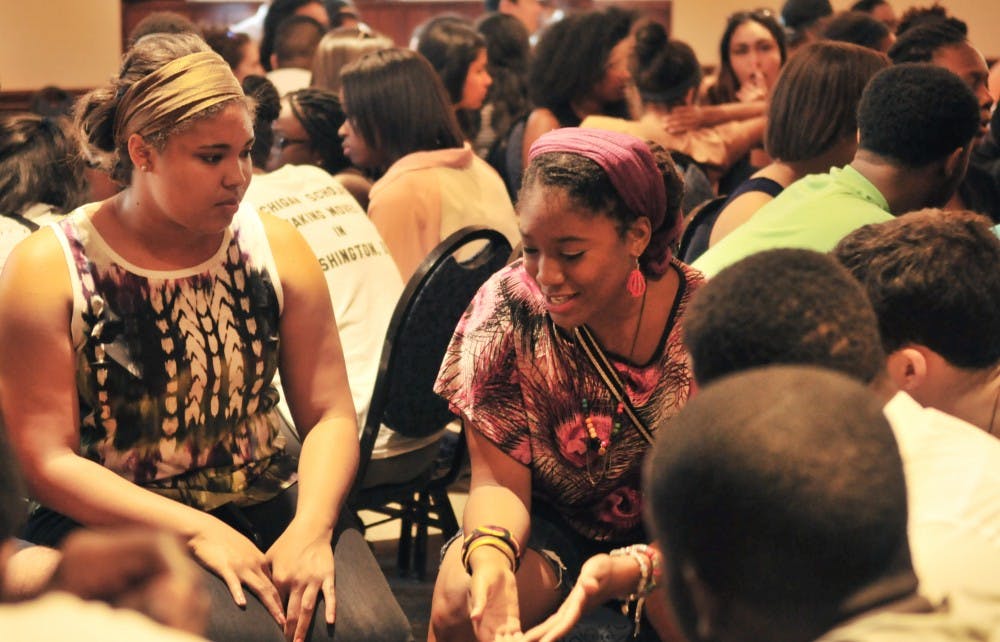
A month has passed since 18-year-old Michael Brown was shot in Ferguson, Mo. The mass protests have quieted down, but the energy is still felt on Penn’s campus. Not in the form of a protest, or a large-scale public demonstration, but instead by quiet planning, organizing and informal discussions.
The energy has also been focused on uniting the existing black student community at Penn. College senior Keishawn Johnson, who is the president of Penn’s chapter for the National Association for the Advancement of Colored People, said “there is more interest in seeing the black community coalesce and become more supportive of each other,” since the events in Ferguson.
“I think Ferguson really lit a fire,” he said.
Johnson pointed to the town hall discussion forum about Michael Brown’s death held during New Student Orientation as an example of the “renewal or energy” behind building cohesiveness. In addition, he noticed that attendance at the most recent meeting of Black Men United, a group where black male students gather to talk about the issues they face, was the highest he had seen in a while.
“It was very informal, but to have that kind of showing says a lot about what the events in Ferguson did to coalesce the community,” Johnson said.
A more formal example of this type of collaboration is the Black@Penn campaign. For the first time on Penn’s campus, graduate students have joined with undergraduate students in connecting the two populations.
Lloyd Talley, the vice chair of Black Graduate and Professional Students Assembly, founded the campaign. Talley, a first-year Ph.D. candidate in the Graduate School of Education, said the campaign was inspired by the events in Ferguson. “We recognized how important it was to take on the importance of this responsibility because of how devastating the situation in Ferguson was for some students,” he said.
The campaign, however, is not a political one. “It’s about connecting all black students across campus who have similar experiences and having them be able to support one another,” Talley said.
The energy is also translating into concrete actions.
Two Graduate Advisors in DuBois College House, Hafeeza Anchrum and Brittany Keesling, are planning a forum in early October for DuBois residents called, “How Does it Feel to be a Problem?”
The event will provide a “safe and therapeutic environment” for students to openly discuss the relationship between the community and the law enforcement, said Anchrum, a first year Ph.D. candidate in the Nursing school.
The NAACP is also planning to hold an event in October called “Demystifying the Media” to talk about the more subtle effects of racism, such as how blacks are portrayed in national media.
Others like UMOJA — the umbrella group for black student groups on campus — are acting as facilitators for longer term projects.
At the UMOJA retreat this past weekend, students came together to plan action on issues raised by Ferguson. They identified six areas that they want to address: 1. Direct Support/Contact With Ferguson; 2. Campus Policies; 3. Policy/Legislation (Nationally/Locally); 4. Education Initiatives for Voting; 5. Education Initiatives for the Judicial System (At Penn and in Philadelphia) and 6. Programming For Incoming Freshman.
Ebony Easley, a College senior and president of the Delta Sigma Theta sorority chapter at Penn, attended the retreat and said a major theme was about connecting and utilizing resources that are already present on campus.
“People were really thinking about mobilizing and how to get things going,” she said.
“We are all feeling this together. It’s not just an undergraduate issue, and it’s not just a graduate issue and not just a student issue,” Easley added.
The Daily Pennsylvanian is an independent, student-run newspaper. Please consider making a donation to support the coverage that shapes the University. Your generosity ensures a future of strong journalism at Penn.
DonatePlease note All comments are eligible for publication in The Daily Pennsylvanian.





